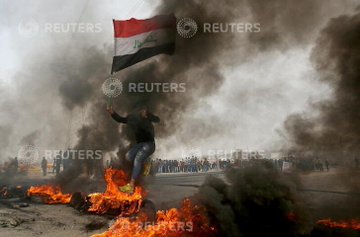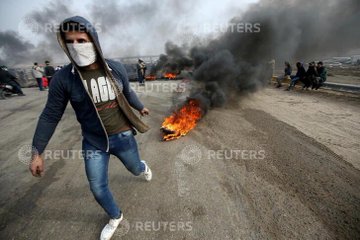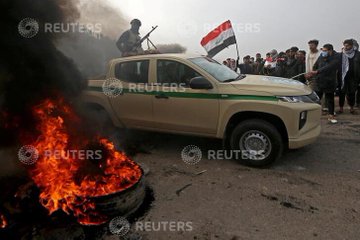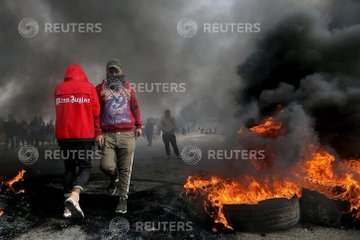Rukmini Maria Callimachi is Judith Miller. At best, she's Judith Miller. She heard what she wanted to hear and didn't verify any of it because it was all too good for the story she wanted to tell. I warned and warned for years and years that Rukmini was a liar and that her 'reporting' was not sound. I didn't know NYT had started retracting it until today and I saw it on Arabic social media -- with a note saying this site had warned people. We did. Thank you to the Arabic readers who notedthat.
David Folkenflik (NPR) explains:
The New York Times has retracted the core of its hit 2018 podcast series Caliphate after an internal review found the paper failed to heed red flags indicating that the man it relied upon for its narrative about the allure of terrorism could not be trusted to tell the truth.
The newspaper has reassigned its star terrorism reporter, Rukmini Callimachi, who hosted the series.
Caliphate relayed the tale about the radicalization of a young Canadian who went to Syria, joined the Islamic State and became an executioner for the extremist group before escaping its hold.
Eric Wemple (WASHINGTON POST) reports on how journalists were raising red flags for some time:
Several Times journalists who had long ago alerted their superiors to problems with Callimachi’s reporting felt that the Times’s mea culpa contained a gap: Where was the pointed acknowledgment that “Caliphate” was a wreck several years in the making? Sure, the editor’s note cited editorial breakdowns in the vetting of the podcast series. But why not admit that editors shunted aside complaints about Callimachi long before assistant managing editor Sam Dolnick approached Callimachi about making a podcast on the Islamic State?
Those journalists had reason to believe such an admission was afoot. On Thursday, top editors at the Times presided over a meeting with staffers who had worked with Callimachi over the years. Multiple sources who attended the meeting described it as a painful affair in which masthead officials acknowledged lapses in management and their subordinates blasted them for not acting on their flares.
Particularly outspoken was C.J. Chivers, a former foreign correspondent and now a staff writer for the New York Times Magazine. Chivers was among the first Times reporters to channel his worries to editors at the paper. For his presentation at the Thursday meeting, Chivers spoke from prepared remarks. He said: “Warnings were not just dead letters. They became a basis to impugn people personally and professionally.”
[. . .]
Staffers had a great deal to say. One objected that Callimachi’s work had embraced stereotypes of Muslims and that if the newspaper had treated African Americans in the same way, the Times would have much bigger problems. A staffer from the Washington bureau noted that a masthead official had warned journalists in the capital to independently verify Callimachi’s contributions to collaborative stories. Another gripe: Washington reporters were commonly hauled in at the 11th hour to buttress reporting in Callimachi’s stories. Such a scenario occurred in Chapter 6 of “Caliphate,” when three D.C. reporters were drafted to press U.S. officials on the alleged activities of Abu Huzayfah.
Long before the podcast started, when it was just her garbage text, we noted she was trafficking in stereotypes and racism. There's one person I really want to call to the carpet on this because when I made that point here, he suddenly made his Twitter feed all about her. He hates me (I could care less). And I'd love to call him out. But his world publicly crumbled so I will just Dionne Warwick it and walk on by. Peter Beaumont (GUARDIAN) notes Rukmini offered Tweets in lieu of an apology:
“Thinking of the colleagues and the newsroom I let down is gutting,” she wrote.
While she said that she had reflected her awareness of some of her sources lies in the podcast: “I also didn’t catch other lies he told us, and I should have. I apologize for what we missed and what we got wrong.”
She's a liar. Shame on the people who promoted her work, who used their platforms -- their blogs, their programs, their Twitter feed -- to promote her. Shame on them all.
The big news in Iraq today? A missile attack. Aqeel Najim, Hamdi Alkhshali and Nicky Robertson (CNN) report:
A rocket attack on Baghdad's diplomatic Green Zone Sunday night was "a terrorist act" that undermines Iraq's international reputation, the country's president says.
The US Embassy in Baghdad Tweeted the following:
The U.S. Embassy confirms rockets targeting the International Zone resulted in the engagement of Embassy defensive systems. There was some minor damage on the Embassy compound but no injuries or casualties. 1/
We have received reports of damage to residential areas near the U.S. Embassy and possibly some injuries to innocent Iraqi civilians. As we have said many times... 2/
... these sorts of attacks on diplomatic facilities are a violation of international law and are a direct assault on the sovereignty of the Iraqi government. 3/
We call on all Iraqi political and governmental leaders to take steps to prevent such attacks and hold accountable those responsible. 4/4
Hadi al-Amari heads the Badr militia (which the US government defines as a terrorist organization). ALSUMARIA reports that al-Amari has condemned the rocket attack. ALSUMARIA also has a photo essay about a nearby apartment that was hit by a photo essay.
Meanwhile protests continue in Iraq. RUDAW reports:
Thousands of federal government employees in Basra blocked roads to the
southern Iraqi province’s oilfields on Sunday, vowing to continue their
protest until the government of Prime Minister Mustafa al-Kadhimi pays
them nine months of unpaid salaries.
In the aftermath of anti-government protests in October 2019, the Iraqi
government pledged to recruit 30,000 mostly young men and women from
Basra on contract, a poverty stricken province whose vast oil wealth is
used to fund the government. The new employees were distributed amongst
various federal government institutions.
The employees who took to the streets on Sunday morning said they have not been paid for nine months.
We'll note these Tweets.
Saturday night, we noted that the Iraqi government was devaluing the dinar. ALMADA reports on the move and quotes economic analyst Salam al-Suaisem stating that the decision will have a harsh impact on the Iraqi people and will worsen poverty. JoJo Jabbari Tweets:
The following sites updated:



